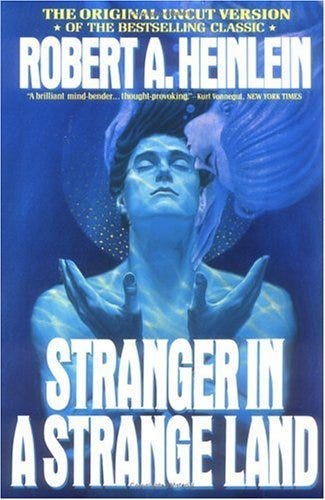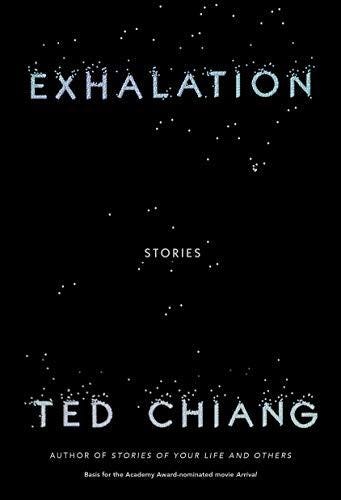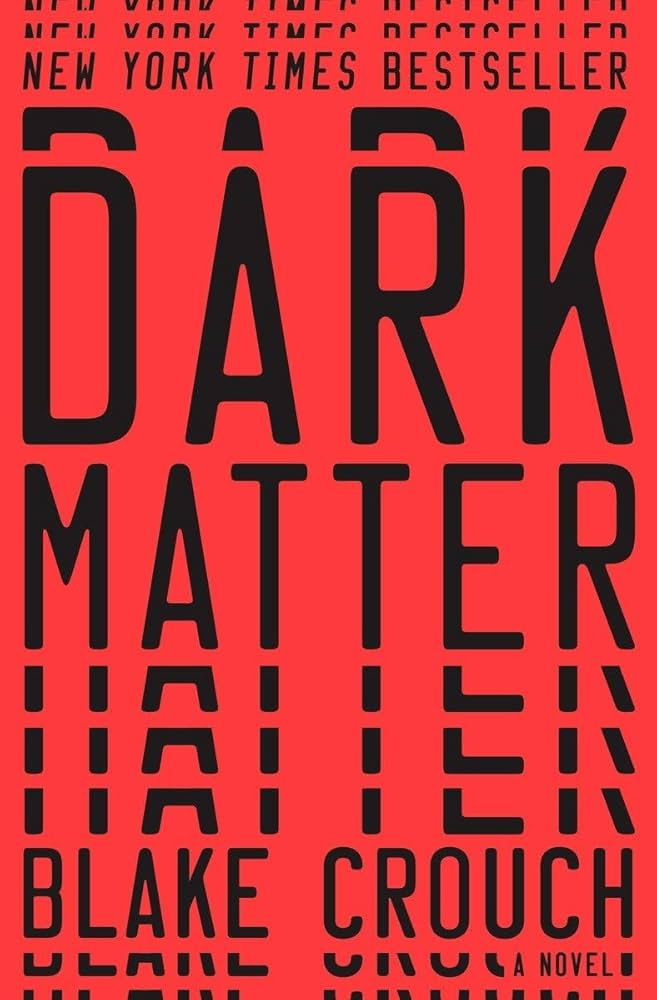I’m a huge fan of science fiction, but have had trouble putting this post together while attempting to draw lines around what is and isn’t sci-fi in my mind. Many of my favorite books blur genres, with science fiction intermingling with fantasy, horror, speculative fiction, magical realism… and then many of them I’m not even sure how to describe. I’ve settled vaguely on defining science fiction books as those that work to explain the scientific “why” of their premise or setting, even if that science has a completely different logic than our own. So all that said, here is my attempt at some delineation with a list of my very favorite science fiction reads and extremely brief summaries. Many of those not listed in the “series” section are also parts of series, but that I haven’t read all of. These are presented in no particular order, except that I’ve included which popular books I found only “meh” at the end just to start some arguments 🙃
Classic peak sci-fi
Stranger in a Strange Land by Robert Heinlein: A human raised on Mars returns to Earth and both learns and challenges social customs. This one surprised me with how modern it still feels.
Do Androids Dream of Electric Sheep? By Philip K. Dick: The basis for Bladerunner, this is a classic exploration of what differentiates humans and androids.
A Wrinkle in Time by Madeleine L’Engle: My first real exposure to sci-fi as a kid (and one of my favorite tattoos), this has held up on a reread as an adult as remarkably creative.
Series
Dune by Frank Herbert: There are 6 Dune books, I have read 4 of them, and I recommend you read 3 of them. I think the description of “Star Wars for Adults” is apt.
Broken Earth Trilogy by N.K. Jemison: Beginning with The Fifth Season, I love that this sci-fi/fantasy series has incredibly complex world building that feels easy to jump into.
Lilith’s Brood (Xenogenesis series) by Octavia Butler: A huge favorite of mine, this is a weird and wild book with fascinating ideas about sex, gender, and what is core to being human.
Short Stories
The Martian Chronicles by Ray Bradbury: This is a collection of short stories, but connected to one another through little vignettes (I learned this genre is apparently called a “fix-up” novel). It’s an emotionally powerful book that kept me guessing.
Exhalation by Ted Chiang: Speculative fiction on varying topics from free will to time travel, beautifully written.
Tenth of December by George Saunders: These ten stories have stuck with me since reading the book years ago. They’re emotional, haunting, and darkly funny.
Others
Annihilation by Jeff VanderMeer: A unique and eerie novel about an expedition into “Area X,” which has a tendency to impact people in bizarre ways. Four women are tasked with mapping their small group’s journey, and it’s weird as hell in the best way.
Dark Matter by Blake Crouch: The suspense of this book! This sci-fi thriller is a favorite of mine for also being a love story at its core, and taking place in Chicago to boot.
Slaughterhouse-Five by Kurt Vonnegut: While Slaughterhouse is a blend of genres, time travel and alien abduction add enough science fiction to this anti-war novel that I’m counting it. I couldn’t recommend this extremely bleak and hilarious book enough.
Didn’t Love
The Left Hand of Darkness by Ursula K. LeGuin and Foundation by Isaac Asimov: I’m grouping these together because I had the same reaction to both—this is so interesting, and catching up with the world building is just so. much. work. I enjoy both authors, but the details were too dense for these to feel enjoyable for me.
The Hitchhiker’s Guide to the Galaxy by Douglas Adams: I don’t know guys, this was just too much. I love a silly satire but I found it annoying 😬
What on my list do you love? What can’t you believe I omitted? Do you celebrate “Towel Day” and think I need to lighten up?
Lastly, am I living in a science fictional universe with what’s clearly a little alien in my home?






Some great choices on there! Love Ted Chiang, and the Annihilation trilogy.
I read Left Hand of Darkness for the first time recently and enjoyed it, though I get your point about the density of details. I read Foundation long enough ago (I was probably about 12) that I took the detail as a matter of course.
Another classic that I read recently is Stanisław Lem’s Solaris. Also sometimes dense, but well worth reading.